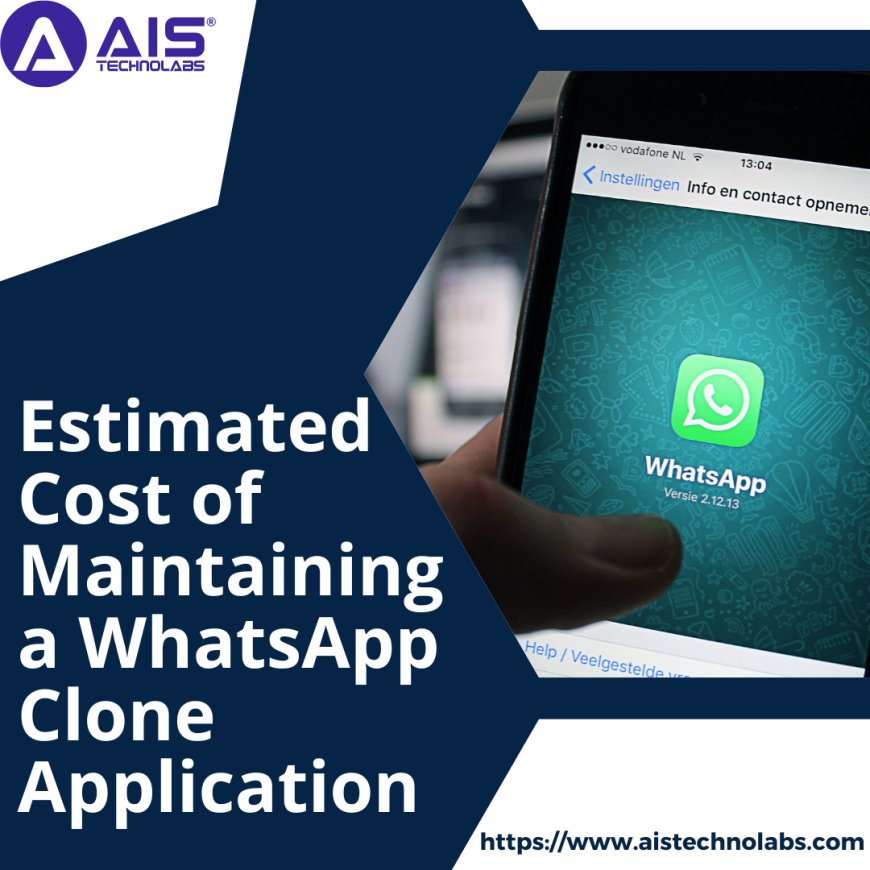Estimated Cost of Maintaining a WhatsApp Clone Application
Maintaining a WhatsApp clone application involves various costs, including server hosting, database management, developer salaries, third-party API integrations, and security measures.

Creating a WhatsApp clone application can be an exciting venture, but it's important to understand the costs involved, not only in development but also in maintaining the app. Maintaining a WhatsApp clone application involves multiple cost factors including server costs, development team salaries, third-party integrations, security updates, scalability concerns, and more. Let's break down these costs to provide a clearer picture of what you might expect.
1. Server and Hosting Costs
One of the most significant ongoing expenses for a WhatsApp clone application is server and hosting costs. Since a WhatsApp-like app handles real-time messaging, file transfers, voice and video calls, and more, it requires robust servers to ensure smooth performance.
- Server Infrastructure: Depending on the app's user base, you might need scalable cloud hosting solutions like AWS (Amazon Web Services), Google Cloud, or Microsoft Azure. The cost for such services can vary greatly depending on the region, bandwidth usage, storage requirements, and other factors.
- Estimated Cost: For a small to medium-sized user base, server costs could range from $500 to $5,000 per month. For a larger user base, this could easily exceed $10,000 per month.
2. Database Management Costs
A WhatsApp clone source code relies heavily on databases to manage user data, messages, contacts, and multimedia files. Efficient database management is crucial for maintaining the speed and reliability of the application.
- Database Solutions: You may opt for databases like MySQL, PostgreSQL, or NoSQL solutions like MongoDB and Cassandra. Each comes with its own maintenance costs, which include licensing fees (if applicable), backups, redundancy, and scaling.
- Estimated Cost: For a reliable database solution, you could expect to spend anywhere from $200 to $2,000 per month based on the size and redundancy requirements.
3. Developer and Maintenance Team Salaries
Maintaining a WhatsApp clone application requires a dedicated development team for regular updates, bug fixes, new feature rollouts, and performance optimization. This team may include front-end developers, back-end developers, mobile app developers, DevOps engineers, and QA testers.
- Salary Costs: Depending on the region, the average salary for these roles can vary significantly. In countries like the United States, the average salary for a software developer is around $80,000 to $120,000 per year. However, outsourcing to regions like Eastern Europe, India, or Southeast Asia can reduce these costs.
- Estimated Cost: A basic team of 4-6 developers could cost around $15,000 to $30,000 per month if based in Western countries. Outsourcing can bring this down to around $5,000 to $15,000 per month.
4. Third-Party API Integration Costs
Integrating third-party APIs is often necessary to add advanced functionalities to a WhatsApp clone, such as push notifications, payment gateways, and analytics.
- Popular APIs: Firebase Cloud Messaging (for push notifications), Twilio (for SMS and call verification), and payment gateways like Stripe or PayPal.
- Estimated Cost: Depending on usage, third-party API integration can range from $100 to $2,000 per month.
5. Security and Compliance Costs
Security is paramount for any messaging app that handles sensitive user data. A WhatsApp clone source code must implement end-to-end encryption, secure data storage, and adhere to various data protection regulations like GDPR or CCPA.
- Regular Audits and Updates: Regular security audits, penetration testing, and encryption protocol updates are essential to safeguard against breaches.
- Estimated Cost: You can expect to spend around $1,000 to $5,000 per month on security and compliance, depending on the scale and sensitivity of the data handled.
6. Cost of Scaling the Application
As the user base grows, a WhatsApp clone application must scale efficiently to maintain performance and user experience. This includes upgrading server capacity, optimizing database queries, and improving the app's architecture.
- Load Balancers and CDNs: Utilizing load balancers and Content Delivery Networks (CDNs) can help distribute traffic more evenly and improve app performance.
- Estimated Cost: Scaling infrastructure costs can range from $500 to $5,000 per month depending on the growth rate and server architecture.
7. Customer Support and Moderation Costs
Providing customer support and content moderation is essential for maintaining a positive user experience and community standards. This may involve hiring a dedicated support team or using AI-based moderation tools.
- Cost of Support Team: Depending on the scale of the app, a team of customer support executives can range from $2,000 to $10,000 per month.
- AI-based Moderation Tools: Tools like AI-powered moderation can help reduce costs but still require ongoing monitoring.
- Estimated Cost: Integrating AI-based solutions could cost between $500 to $3,000 per month.
8. Regular Feature Updates and Enhancements
To keep the WhatsApp clone application competitive, it is essential to roll out new features regularly. This could include updates like new stickers, group calling features, privacy enhancements, and UI/UX improvements.
- Development Costs for Updates: Depending on the complexity, adding new features can require significant development time.
- Estimated Cost: Regular updates can cost around $1,000 to $10,000 per month.
9. Bug Fixes and Technical Debt Management
Every application accumulates technical debt over time, which needs to be managed to ensure that the WhatsApp clone remains efficient, fast, and bug-free.
- Routine Bug Fixes: Addressing bugs and ensuring smooth functionality requires continuous attention from developers.
- Estimated Cost: Bug fixes and technical debt management could cost approximately $1,000 to $5,000 per month.
10. Marketing and User Acquisition Costs
Although not strictly a part of maintenance, marketing, and user acquisition are ongoing efforts to grow the user base. Costs here will depend on the strategy—whether it's through digital marketing, influencer campaigns, or traditional advertising.
- Estimated Cost: For a moderately aggressive marketing campaign, the costs can range from $2,000 to $20,000 per month.
11. Legal and Licensing Costs
Ensuring that the WhatsApp clone source code adheres to all relevant legal standards, copyrights, and licenses is critical. Failing to do so can result in hefty fines and legal battles.
- Cost of Legal Compliance: Regular legal consultations and maintaining proper licenses can also incur costs.
- Estimated Cost: Legal and licensing costs could range from $500 to $3,000 per month.
12. Monitoring and Analytics Tools
Monitoring tools to analyze user behavior, app crashes, and performance metrics are vital for maintaining a WhatsApp clone application. Tools like Google Analytics, Firebase, and Mixpanel are commonly used for these purposes.
- Estimated Cost: Depending on the tools and usage levels, the cost can vary from $100 to $1,000 per month.
Total Estimated Cost Breakdown
- Low-End Estimate: Approximately $25,000 to $30,000 per month
- High-End Estimate: This could go up to $70,000 to $100,000 per month or more, especially for a large-scale app with millions of users.
Conclusion
Maintaining a WhatsApp clone application is not a trivial endeavor. The costs associated with servers, database management, development teams, third-party APIs, security, scalability, customer support, marketing, legal compliance, and analytics tools all add up. It is essential to consider these factors when planning to launch and maintain a WhatsApp clone using a WhatsApp clone source code. Proper planning, budgeting, and an understanding of these costs can help ensure that the application is sustainable, secure, and successful in the long term.
What's Your Reaction?
 Like
0
Like
0
 Dislike
0
Dislike
0
 Love
0
Love
0
 Funny
0
Funny
0
 Angry
0
Angry
0
 Sad
0
Sad
0
 Wow
0
Wow
0



















































